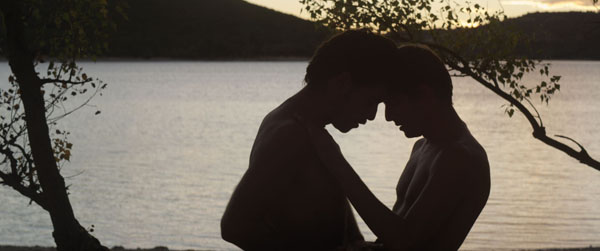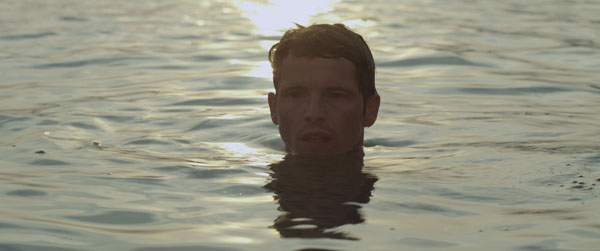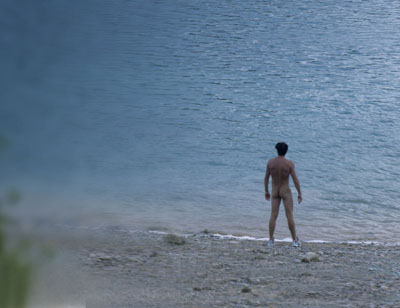“Stranger by the Lake is a film about the incongruities of pleasure, about the lack of separation between wanting and not wanting,” writes Diego Costa at Slant. “It’s difficult to recall a film that understands gay desire, or desire tout court, so well and which translates it so strikingly. Its magnificence comes from the way it unfolds like a literary myth, with the visceral simplicity of a tragedy, while demystifying certain truisms about queer sexual practices: that gay men didn’t instrumentalize one another as much before Grindr, that digital cruising has replaced face-to-face cruising, that flirting with death is in the libidinal makeup of only a pathological minority.”
For Steve Erickson at Gay City News, this “vision of death-haunted sex isn’t too far from magnets for gay and lesbian controversy like Cruising and Basic Instinct. At a lakeside cruising area, Frank (Pierre Deladonchamps) witnesses Michel (Tom Selleck lookalike Christophe Paou) kill a man. Rather than turning Michel in, Frank finds the handsome man even hotter and begins having sex with him. Stranger by the Lake knowingly toys with stereotypes of gay men as hedonistic, promiscuous creatures who have disconnected sex from emotion. Its critique of gay culture is harsh—its characters can barely sustain enough intimacy to have friends. It takes place in an isolated world where there are no alternatives to this chosen mode of existence. Here, the utopia of ‘70s sexual liberationists has gone badly awry, and Stranger by the Lake charts the consequences.”
“With its graphically unsimulated couplings, rigorously composed widescreen frames, eerily lush landscapes and empathic understanding of gay culture in all its multifaceted shades, the film feels like a queer-cinema landmark,” writes Keith Uhlich in Time Out New York.
“Viewers have come to be understandably wary of any movie that depicts gay sex as tortured or dangerous, fearful that it may intimate homosexuality itself is a dark desire or an aberration,” writes Reverse Shot‘s Michael Koresky. “The political weight of representation inevitably bears down on the viewer of Alain Guiraudie’s Stranger by the Lake, an explicit film about amorphous desire that unapologetically combines menace and eroticism, and daringly—and most alienatingly for those who want to be told what to think at the movies—it has no agenda at all. This thoroughly intoxicating experience manages to exploit sex without cheapening it, interrogate without demonizing it.” Ultimately, “the film is less about gayness than the single-minded, direct elegance of masculine desire.”
This summer, Cinema Scope editor Mark Peranson introduced a conversation between Guiraudie and João Pedro Rodrigues by noting that a “beguiling sense of mystery pervades L’inconnu du lac, a function of the precise editing, the atmosphere, and the controlled action; a Hitchcockian ambience is established prior to the event that motivates the film’s action… An adult fairy tale that’s grounded in reality, it’s a close-to-perfect film, gorgeously shot using natural light (on the Red Epic, in meaningful widescreen!), meticulously constructed—there’s only one close-up in the entire film—and emotionally developed.”
“Stranger by the Lake mildly indulges a backward-looking pastiche that seems to be forming a contemporary current in French cinema,” suggests Marilyn Ferdinand. “The sun-washed days of idleness and pleasure by an Edenlike beach are bathed in Summer of ’42 (1971) nostalgia…. It’s possible to look at Franck’s fatal attraction as being akin to the search of the main character for a lover who will kill her in the 1977 Richard Brooks film Looking for Mr. Goodbar, but Franck is not the suicidal one here.”
Guiraudie and cinematographer Claire Mathon “hold shots of trees and sky so that allowable light signals time of day as well as mood,” notes Howard Feinstein at Filmmaker. “They film surrounding vegetation as much for commentary as for ambience. Light and shadow help define the characters, simple men whose conversations do not go beyond small talk and the realm of personal experience…. Nathalie Vidal’s subtle sound design makes good use of nature’s music. The overall effect is sublime.”
More from Richard Brody (New Yorker), Jose Solís (Film Experience), and Scott Tobias (Dissolve). Peter Labuza and Carson Lund discuss the film in the latest Cinephiliacs podcast.
Earlier: Reviews from Cannes, where Guiraudie won the Un Certain Regard Directing Prize. Stranger by the Lake was part of the Contemporary World Cinema program in Toronto and screens tonight and Wednesday in New York.
Update, 10/3: “Having built up the tension to a breaking point, Giraudie doesn’t let down the audience,” notes Gerard Raymond at the House Next Door. “Stranger by the Lake moves toward a startling and bloody climax and then, as night falls on the lake, leaves us with a disturbing conclusion.”
Updates, 10/14: Stranger “would make a great double feature with Strangers on a Train,” suggests Michael Smith, who’s caught the film in Chicago. “Unlike most most ‘erotic thrillers,’ however, the film’s explicit sex scenes seem less designed to titillate than to serve as a jumping off point for a complex inquiry into the nature of voyeurism and sexual desire. Finally, the movie functions almost as an ethnographic documentary, and a beautifully photographed one at that, into a very specific subculture… One of the very best films of the year.”
The Guardian‘s Peter Bradshaw “was reminded of Alan Hollinghurst‘s The Swimming Pool Library or Thom Gunn’s poem The Discovery of the Pacific. But when a single, terrible event takes place, the mood swings to that of classic Hollywood suspense, like John M. Stahl’s Leave Her to Heaven (1945) or George Stevens’s A Place in the Sun (1951), movies in which a beautiful lake becomes the epicenter of danger…. I wondered if Guiraudie lost control of his movie at the end, just a little, but this utterly gripping and absorbing movie is one of the best at this year’s London film festival.”
Peter Knegt talks with Guiraudie for Indiewire.
Update, 11/27: Mark James for Film International: “It’s almost impossible to consider the philosophical implications of the twinning of Eros and Thanatos if homophobes and gay moralists still tar elements of gay culture as ‘a culture of death,’ or if there still hasn’t been an honest accounting of the history of AIDS because of the prevailing sense that gay people somehow wanted to drop dead by the hundreds of thousands. The questions that Stranger by the Lake ends on—Is Michel a serial killer? Will he leave the lakeside and prey on more people, or is he just a sociopath, a cold lover?—resemble this line of accusatory inquiry, and the denouement does them no favors. Still, the combination of a rich moral texture, gorgeous evocation of place, an honest treatment of gay sexuality and deeply-felt emotional suspense is a rare feat to pull off, and Guiraudie only stumbles on the dismount.”
Updates, 1/21: James Quandt for Artforum: “João Pedro Rodrigues, the Portuguese director with a similar interest in homoerotic fixation and ritual (for instance, O Fantasma [2000]), recently told Guiraudie that Stranger’s generosity of spirit made him ‘think of a homosexual version of Jean Renoir.’ But it is Renoir’s opposite, the chill, geometric Chabrol, whose work the film most resembles. At the end of the French master’s Le Boucher, a schoolteacher who has been complicit with a serial killer stands numbly gazing into a bucolic setting of trees and river. At three key junctures in Stranger by the Lake, Guiraudie places Michel’s visage close and central in the frame, suggesting his murderous dominion, while in the film’s final, barely discernible image, Franck’s face tentatively displaces his lover’s as he stares into the impenetrable darkness, helpless before his fast-approaching fate.”
New interviews with Guiraudie: Nicholas Elliott (BOMB) and Nicolas Rapold (Film Comment).
Updates, 3/3: Stranger “presents a kind of staging of a mind, with actions and reactions figuring as parts of a psyche working itself out,” writes Francey Russell in the Los Angeles Review of Books.
“A large part of the film’s effectiveness is down to its roster of self-imposed formal limitations, which concentrate the attention into a kind of conceptual and narrative tunnel vision,” writes Ben Walters for Sight & Sound. “It uses only exterior shots, only natural light and only a handful of locations, all in the immediate vicinity of the lake. It features only men. It includes almost no close-ups or music, relying on compositions incorporating the natural environment and sound design foregrounding wind and waves. It takes place over ten days, almost all of them marked by an establishing shot of the car park used by the lake’s visitors; these shots, like others repeated as the days pass, take on a weird double valence as the story continues, suggestive both of a ticking clock and a Groundhog Day-style stasis.”
More from Melissa Anderson (Voice), Richard Brody (New Yorker), Richard Corliss (Time), Bilge Ebiri (Vulture), Ben Kenigsberg (AV Club, B), Ryan Lattanzio (Thompson on Hollywood), Michał Oleszczyk (RogerEbert.com, 4/4), Nicolas Rapold (L), A.O. Scott (NYT), Scott Tobias (Dissolve, 4.5/5) and Keith Uhlich (Time Out, 4/5).
Interviews with Guiraudie: Brian Brooks (Film Society of Lincoln Center), Sophie Monks Kaufman (Little White Lies), R. Kurt Osenlund (Slant) and Daniel Walber (Film.com).
NYFF 2013 Index. For news and tips throughout the day every day, follow @KeyframeDaily on Twitter and/or the RSS feed. Get Keyframe Daily in your inbox by signing in at fandor.com/daily.






